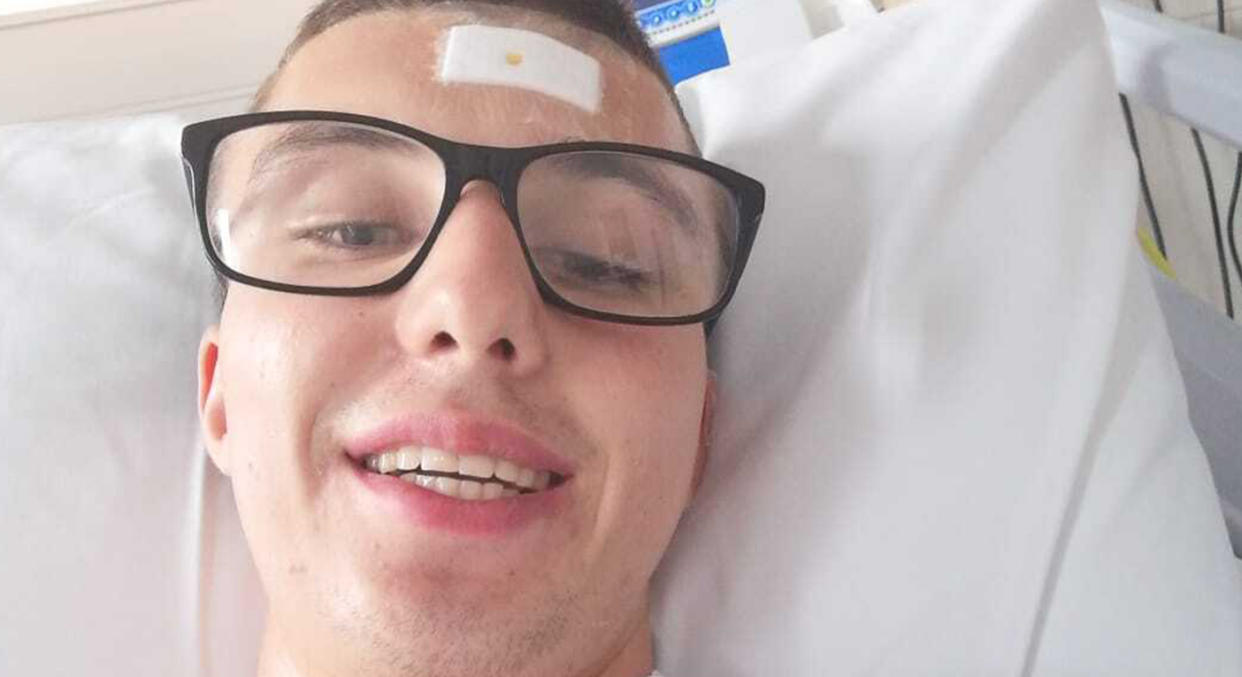Teen, 17, has surgery to remove brain tumour on the eighth anniversary of his mother’s cancer death

A teenager had life-saving surgery to remove a brain tumour after believing he had beaten the disease when he was just three years old.
Matthew Pullan, 17, from Manchester, first went under the knife as a toddler after doctors discovered he had an ependymoma tumour.
After being given the “all clear” 14 years ago, medics found another malignant mass had developed when Matthew began acting “really clumsy”.
Read more: Leukaemia patient, 14, has weeks to find bone marrow donor
He spent six days in hospital, with the surgery taking place on July 7, the eighth anniversary of his mother’s death from breast cancer.
Matthew is anxiously awaiting the results of his latest scan, which should reveal whether the operation was a success.
‘Huge shock’ at second diagnosis
Matthew was first diagnosed with a relatively non-aggressive brain tumour in 2006.
After years of routine MRI scans came back clear, his family noticed he started acting out of sorts several weeks ago.
“Earlier this summer we noticed Matthew was getting really clumsy, so he went to talk to his consultant, who sent him for a precautionary scan,” said his twin brother Alex.
“None of us could believe it when the scan revealed a new 4cm by 4cm tumour in the cerebellum part of his brain. It was a huge shock.”
Matthew and Alex live with their father Gary, stepmother Claire, 14-year-old brother Mark and 12-year-old stepbrother Samuel.
“We were all devastated to get the news about Matthew’s brain tumour but dad was particularly shaken, having lost mum to cancer,” said Alex.
Read more: Three-year-old cancer victim inspires campaign to boost funding
“We are a tight-knit family and feel we are in it together and will support each other through these difficult times.”
Matthew went under the knife at Salford Royal Hospital. Due to the coronavirus outbreak, Alex could not be by his brother’s side during the operation.
“Matthew and I are extremely close and it was awful having to wait for news while he was in the operating theatre for nine hours,” said Alex.
“I don’t really remember much about Matthew’s first experience of having a brain tumour, as we were only toddlers at the time.”
While the family is awaiting the results of Matthew’s latest scan, a biopsy of his tumour reveals it may have some of the same cells as an astrocytoma - the most common type of brain tumour - however, doctors cannot be sure.
“It seems as if this is a very rare type of tumour, and both the surgeon and oncologist said they hadn’t come across anything like it before,” said Alex.
“It’s also unclear whether it is related to the tumour he had as a young child or if he has just been extremely unlucky.”
A team at a specialist centre in Nottingham are further investigating the biopsy.

Hopes ‘fewer people go through the suffering’
Even if the surgery did manage to remove the tumour, Matthew is expected to endure a three to nine week course of radiotherapy, followed by chemotherapy, at The Christie in Manchester.
Alex plans to run for 20 to 30 minutes every day of his brother’s treatment to raise £5,000 ($6,572) for Brain Tumour Research.
“I am extremely proud of Alex’s efforts in raising money for Brain Tumour Research as it will hopefully result in fewer people going through the suffering I have endured twice,” said Matthew.
“Alex and I are quite different as brothers; I like English, business and history, and want to study business management at university, while Alex studies maths, geography and science, and hopes to train as an RAF pilot.
Read more: BBC newsreader George Alagiah reveals his bowel cancer has spread
“One thing we do have in common is a love of running and while I’m not able to run at the moment, this will be the next best thing, as I follow Alex’s progress.”
Matthew Price from Brain Tumour Research added: “It’s clear to see Alex and Matthew have an unbreakable bond, and we are blown away by Alex’s dedication to fundraise in the face of such adversity.
“Matthew’s story reminds us brain tumours are indiscriminate; they can affect anyone at any age.
“Approximately 16,000 people are diagnosed with a brain tumour every year. We cannot allow this devastating situation to continue.”
What is the difference between an ependymoma and astrocytoma?
Ependymomas develop from the ependymal cells that line the passageways containing cerebral spinal fluid.
Although they can be found in any part of the brain or spine, children tend to develop them in a small space at the back of the brain called the posterior fossa.
Ependymomas make up around 1.9% of all brain and central nervous system tumours, and 25% of spinal tumours.
Astrocytomas develop from brain cells called astrocytes. They do not spread to other parts of the body due to astrocyte cells only being in the brain and spinal cord.
They are the most common type of brain tumour in the UK, making up around a third (34%) of all diagnoses.
Symptoms of any brain tumour depend on where it develops. Warning signs may include severe headaches, squinting, abnormal eye movements or a “head tilt”.
Treatment is usually surgery, followed by radiotherapy or chemotherapy.



